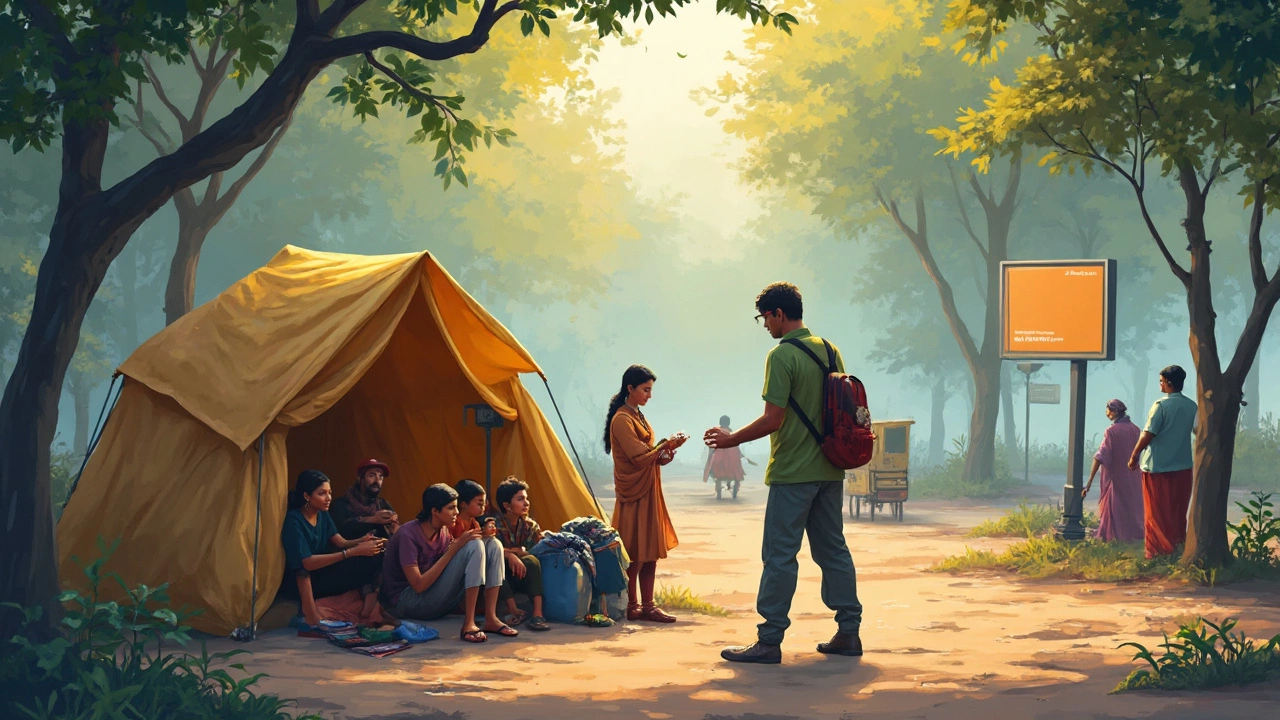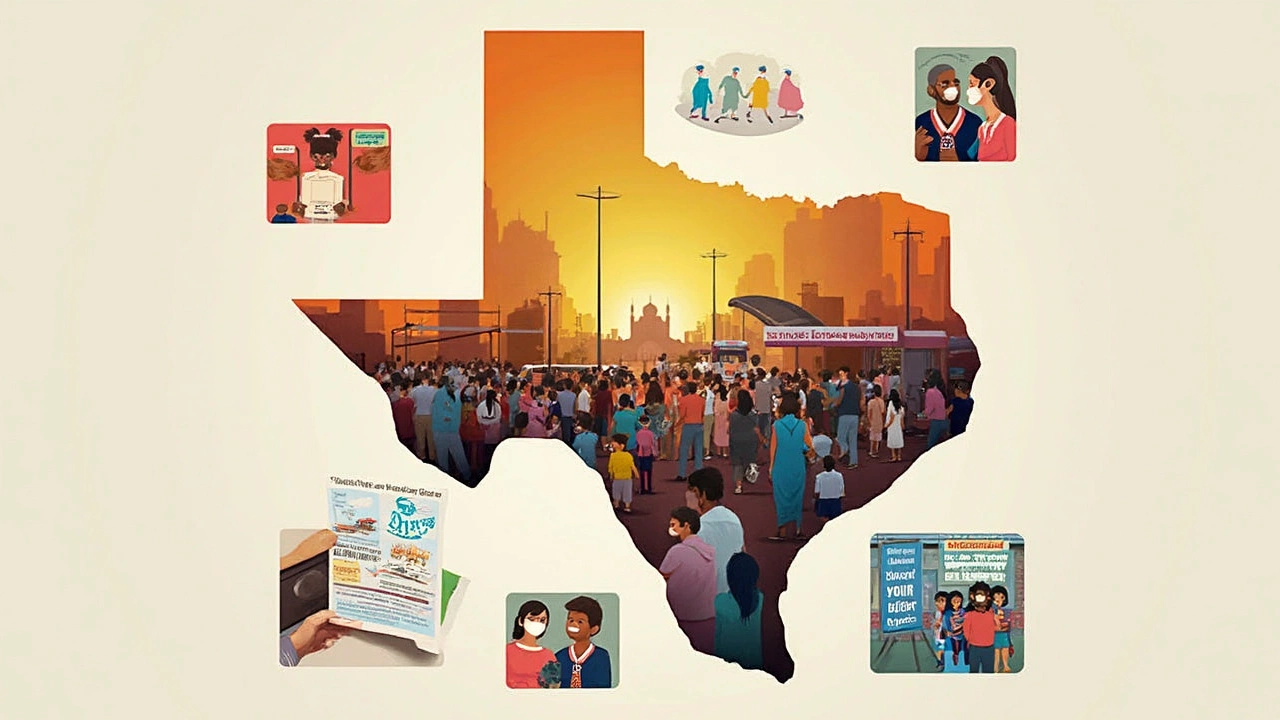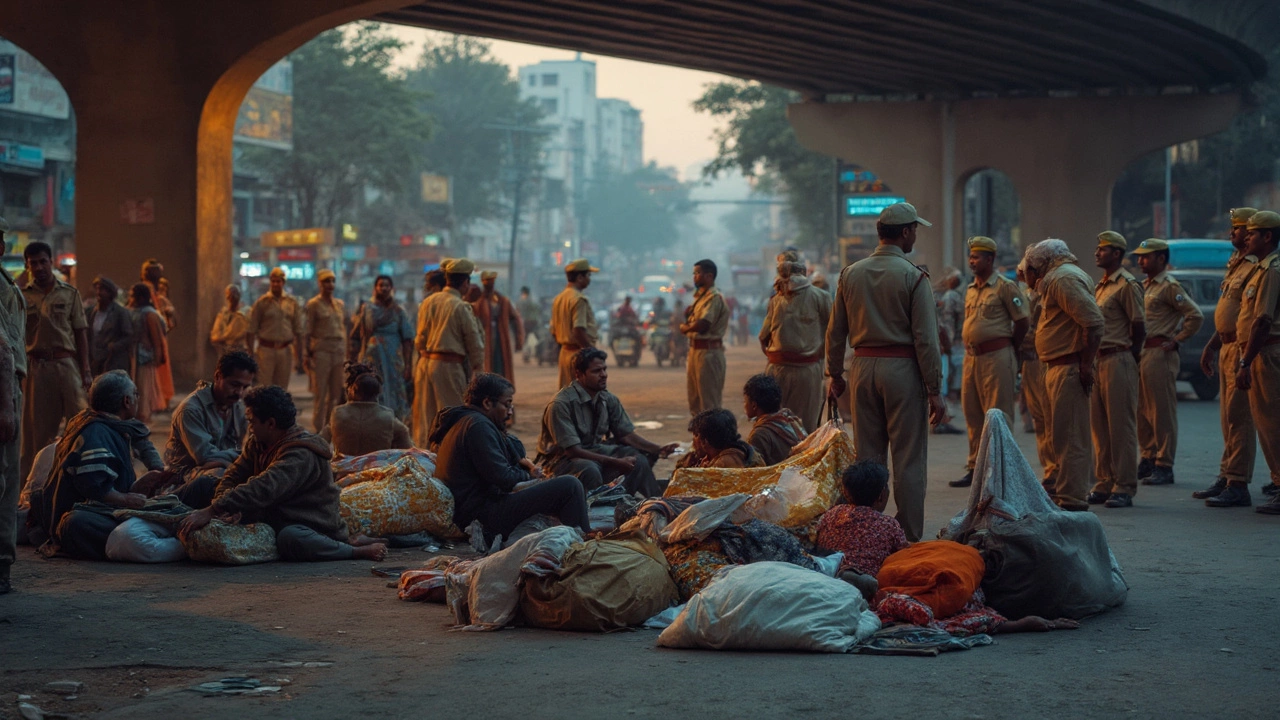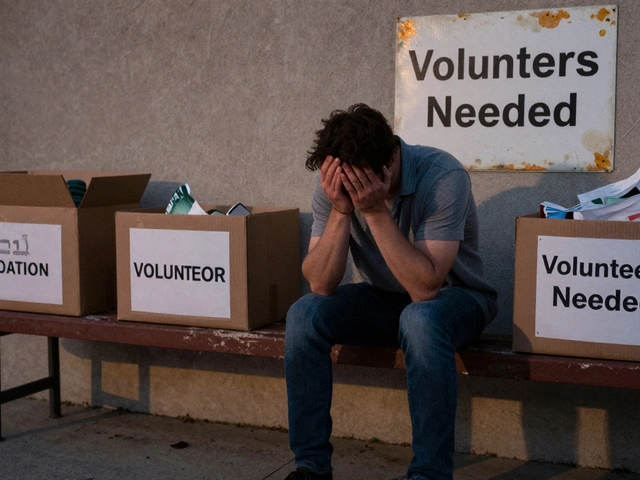Wondering if just being homeless can get you in trouble with the law in Texas? You’re not alone—this question pops up a lot, and the answers aren’t always simple. For starters, Texas doesn’t actually make homelessness itself a crime. But here’s where it gets tricky: what you do (or where you sleep) while homeless can get you ticketed or even arrested. Cities like Austin have banned camping in public spaces, so sleeping on the sidewalk or under a bridge could land you in legal hot water.
If you’re trying to stay under the radar, knowing where it’s legal to rest is half the battle. Some shelters have waitlists or strict rules, so planning is key. It’s also worth noting that many police officers have different approaches—some might offer info on nearby shelters, while others write tickets or make arrests. The situation changes depending on where you are in Texas and how each city handles homelessness.
- How Texas Law Handles Homelessness
- Public Camping Bans and Their Impact
- What Happens if You’re Caught Without Shelter
- Navigating Shelters and Resources
- Tips for Staying Safe and Getting Help
How Texas Law Handles Homelessness
Here’s the bottom line: Texas doesn’t officially label it a crime just to be homeless. But local laws and city ordinances can make day-to-day survival really tough if you don’t have a roof over your head. The most glaring example is how cities deal with “public camping.” In 2021, Texas passed House Bill 1925, which made camping on public property without a permit illegal, no matter where you are in the state. That means sleeping out in parks, under overpasses, or on benches can get you a ticket or even arrested, especially in certain cities.
Let’s get into what that actually looks like. In Austin, for example, voters passed a ban on public camping after a lot of debate and controversy. Overnight, the city shifted from tolerating encampments to clearing them out. Houston and Dallas have their own local rules, mostly aimed at keeping public sidewalks and parks clear. The pattern is the same: homelessness isn’t illegal, but the stuff people often have to do to get by—like sleeping in public—can trigger legal trouble fast.
Here’s a quick look at the key statewide and local rules:
- Homelessness itself isn’t a crime—there are no state laws punishing someone just for being without a home.
- Public camping is banned at the state level (House Bill 1925).
- Cities have their own ordinances about panhandling, loitering, and trespassing, which are often used against folks without shelter.
This patchwork means you can be fine in one spot and ticketed in the next. Many people have been arrested not for anything dangerous, but for setting up a tent or even just resting in the wrong place. Some critics argue this just pushes people around instead of helping them find shelter or support.
Want to see how often these laws come into play? Check this handy data table of citations and arrests related to public camping in a few big Texas cities in 2024:
| City | Public Camping Citations | Arrests for Camping |
|---|---|---|
| Austin | 2,127 | 441 |
| Houston | 895 | 152 |
| Dallas | 1,032 | 198 |
Each city tweaks its enforcement, but the challenge is the same everywhere: these laws make life harder for people without stable housing. If you’re in Texas and worried about local rules, the smartest move is to check city ordinances or reach out to a homeless shelter or legal aid group that can give you the most current info on what’s allowed where you are.
Public Camping Bans and Their Impact
Public camping bans have changed the game for anyone dealing with homelessness in Texas. In 2021, the state passed House Bill 1925, making it illegal to camp in public places outside of designated areas. This means sleeping in parks, under highway overpasses, or on city sidewalks can lead to tickets or even arrest. Major cities have backed this up with their own strict rules. For example, Austin voters approved a citywide camping ban after a huge debate in 2021.
What’s the fallout? It’s pretty clear: folks without homes now have even fewer safe spots to sleep. Get caught camping, and you could end up with a misdemeanor charge and a fine—sometimes as high as $500. But paying those fines? Pretty much impossible for most people living on the street. Not only does this push people into riskier areas (think remote creeks or hidden lots), it also makes it way harder to connect with outreach groups, medical help, or shelters.
| City | Year Ban Enacted | Penalty |
|---|---|---|
| Austin | 2021 | Up to $500 fine & possible arrest |
| Dallas | 2018 | Citation, can lead to arrest with repeat offense |
| San Antonio | 2019 | $200 citation |
It’s no surprise that after these bans, shelter intakes spiked but so did reports of unsafe camps popping up on the outskirts. Emergency services also got more calls about health crises in these out-of-the-way spots. What’s weird is, even some police officers say these bans don’t fix the problem—they just move it around.
If you’re trying to avoid trouble, the best bet is to know the local rules. Most cities post info online about where camping is off-limits. Some nonprofits even update maps showing safe zones or places that aren’t so strictly policed. Always keep an eye out for local outreach vans offering help—they often have up-to-date info and can point you toward safer options.

What Happens if You’re Caught Without Shelter
If you’re out on the streets in Texas and can’t find a bed for the night, your biggest problem might be local ordinances against sleeping in public. For example, Austin made headlines in 2021 when it reinstated a citywide camping ban. This move led to more tickets being handed out and, in some cases, arrests. The state of Texas also passed a law in September 2021 that bans homeless encampments statewide. Getting caught camping where it’s not allowed usually means a ticket, but repeat offenses can get you arrested.
You won’t usually get locked up just for being homeless, but the stuff that often goes with homelessness—like trespassing, loitering, or public intoxication—can result in jail time. Sometimes police give warnings or info about homelessness resources, but there’s no universal approach. It mostly depends on the individual officer and the city’s vibe toward the homeless community.
Here’s how things could go down if you’re found sleeping somewhere illegal:
- You could get a written warning or a ticket (fines range from $50 to $500 depending on the city).
- If you’ve received multiple tickets or ignored them, the risk of arrest jumps up.
- Some cities, like San Antonio, focus more on connecting people to shelters or services instead of jail.
- If you’ve been arrested, you might get a court date—which brings more stress and often more fines.
Check out some real numbers from the Texas city with the strictest laws:
| City | Camping Tickets (2023) | Arrests (2023) |
|---|---|---|
| Austin | 1,650 | 216 |
| Dallas | 1,200 | 180 |
| Houston | 980 | 145 |
Getting lots of tickets adds up quick, and unpaid fines can turn into arrest warrants. Some courts in Texas offer programs where you can do community service instead of paying money, but not every city is that flexible. If you’re caught without shelter, the best bet is to ask for a list of local shelters or services—sometimes police carry info sheets just for this reason.
Navigating Shelters and Resources
Finding a spot in a homeless shelter in Texas isn’t always as easy as showing up at the door. Some nights, you’ll run into waitlists or places that are packed out, especially when the weather gets rough. Major cities like Houston, Dallas, and Austin have more resources, but rules and openings can change day by day. The homeless shelters in Texas usually run on a first-come, first-served basis, and some require an intake process or appointments.
Here’s a quick look at shelter types and how many beds are available across the state:
| City | Emergency Shelter Beds | Transitional Housing Beds |
|---|---|---|
| Houston | ~2,000 | ~1,300 |
| Dallas | ~1,200 | ~800 |
| Austin | ~800 | ~500 |
| San Antonio | ~1,100 | ~700 |
(Source: Texas Homeless Network, 2024)
Not every shelter works the same. Some have curfews, others don’t allow pets, and a few only help certain groups—like women, families, or veterans. It’s smart to call or check their website before heading out. The Texas Homeless Network (THN) keeps an updated directory, and dialing 2-1-1 links you to local resources. You can also ask at local churches, libraries, and day labor centers, since they often know what’s open when.
“We tell people: don’t wait until dark to seek help. Shelters fill up fast, and having a plan early in the day makes all the difference,” says Michael Nichols, President & CEO of Coalition for the Homeless of Houston.
If you need more than just a bed, plenty of shelters have case managers who help with paperwork, finding a job, or getting ID cards. Some even offer showers, laundry, free meals, and basic medical care. If you’re not into shelters, there are day centers where you can cool off, charge your phone, and connect with social workers.
- Call 2-1-1 or check the THN directory for openings
- Bring an ID if you have one, but don’t skip shelter if you don’t
- Arrive early, especially in cold or rainy weather
- Ask about waiting lists—sometimes people drop out at the last minute
- Check for any special requirements (curfew, family status, pet policies)
Knowing your options—and acting fast—can help you get off the street, even if just for a night. The sooner you reach out, the better chance you’ll have at finding a spot where you can rest and regroup.

Tips for Staying Safe and Getting Help
When you don’t have a safe place to call home in Texas, figuring out how to keep yourself safe and get solid help can feel overwhelming. But there are real ways to protect yourself and boost your chances of finding shelter or support—in fact, knowing a few insider tips can really make a difference.
Your first step should be connecting with local homeless shelters. Bigger cities like Houston, Dallas, San Antonio, and Austin have networks of shelters and drop-in centers, but space can fill up fast. The Texas Homeless Network is a reliable website to check for up-to-date openings and resources. If you have a phone, you can also call 2-1-1 in Texas to get connected with a real person who knows what’s available nearby.
Keep yourself safer with a few simple moves:
- Stay around well-lit, public areas at night. Parks, bus stations, and libraries sometimes have security and lower crime risk than isolated spots.
- Carry a charged phone if you can—free Wi-Fi’s available at most libraries and fast-food places, making it easier to reach out or look up shelter openings.
- Hold onto your ID and essentials. Shelters often need to see an ID, and having it can help you with jobs or services later on. Keep your stuff as light and secure as possible.
- Trust your instincts about people. Don’t be afraid to ask staff or volunteers what’s safe or not—most want to help and will point you toward resources.
There are special outreach programs in Texas, too. In some cities, mobile teams from groups like Caritas of Austin or the Salvation Army drive around handing out supplies and info. It’s smart to flag them down—they usually know the best tips for that day or week, like which shelter isn’t full or where free meals are happening.
If you’re dealing with mental health or substance issues, it’s okay to ask for help. The National Alliance on Mental Illness (NAMI) has Texas branches, and hospitals can’t turn you away in emergencies, even if you don’t have insurance. Some shelters have caseworkers who will walk you through applying for SNAP, Medicaid, or housing waitlists while you’re indoors and safer.
If the cops approach or ticket you, stay calm and polite. Ask for a list of available shelters—they are required by law in some counties to give you one before they can do anything else about camping bans. Remember: you have rights, even if you don’t always feel like it. Getting connected to local help makes things less risky and way less lonely.





